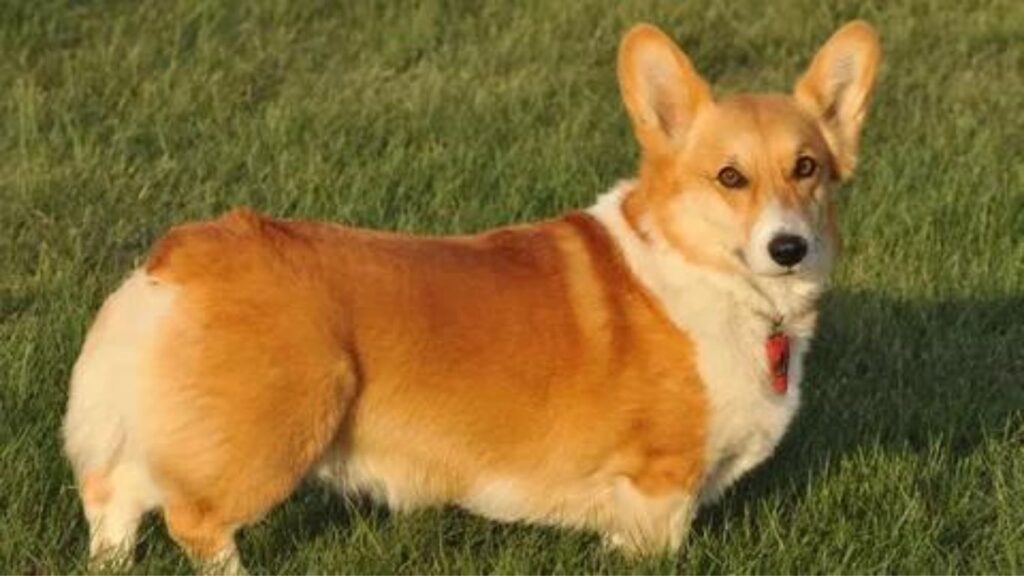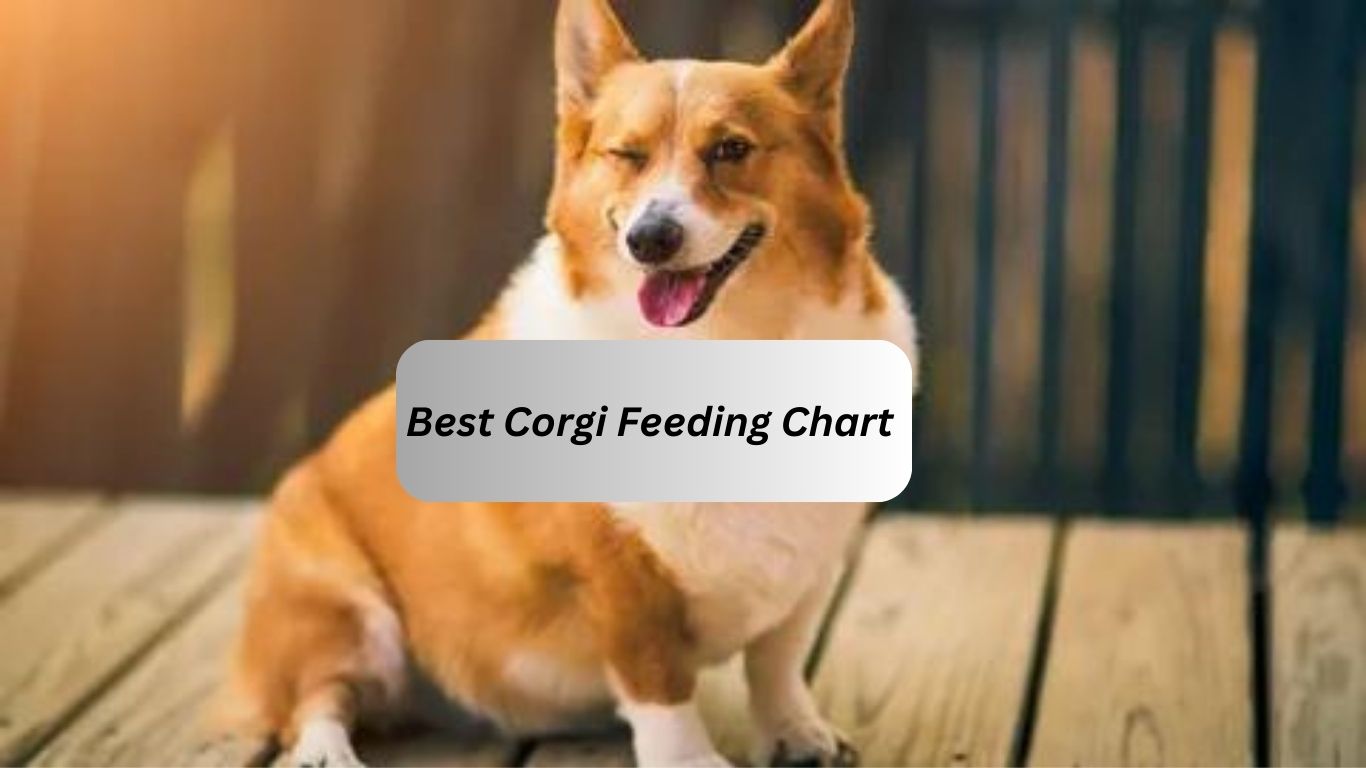Your Go To The Best Corgi Feeding Chart – Breed Palace
Corgi feeding chart, these charming canines are more than just adorable; they’re bundles of energy wrapped in short legs and fluffy tails. With their unique body structure and energetic disposition, Corgis require a careful balance of nutrition to keep them healthy and happy. This chart is designed to simplify mealtime decisions while keeping those little hooves dancing around your feet.
Corgi Feeding Chart Overview
These lovable little furballs, with their short legs and fluffy behinds, have a unique set of dietary needs that are crucial for keeping them healthy and happy. You’ll discover essential guidelines on portion sizes, food types, and meal frequencies that will help keep your furry friend in tip-top shape.
| Age | Daily Feedings | Food per Day | Type of Food |
| 8 weeks | 4 | 1/4 – 1/3 cup | Puppy Food (moistened) |
| 3 – 4 months | 3 | 1/3 – 1/2 cup | Puppy Food |
| 4 – 6 months | 2 | 1/2 – 3/4 cup | Puppy Food |
| 6 – 12 months | 2 | 3/4 – 1 cup | Puppy Food |
| 1 – 2 years | 2 | 3/4 – 1 cup | Adult Dog Food |
| 2+ years | 1 – 2 | 1/2 – 1 cup | Adult Dog Food |
What Is The Best Diet For A Corgi?

The best diet for a Corgi should be well-balanced, focusing on high-quality dog food that meets their specific nutritional needs. Corgis are prone to obesity due to their short legs and long bodies, so it’s essential to choose a diet that is lower in calories but rich in essential nutrients. Look for dog food that lists meat as the first ingredient, includes whole grains, and contains healthy fats.
You may interested in reading about: 5 High Quality Australian Shepherd Breeders In California
Corgi Puppy Feeding Chart
These delightful little dogs, known for their energetic personality and affectionate nature, require a diet that’s tailored to their unique physical needs. One interesting consideration is the balance of nutrients in your Corgi’s diet. Look for high-quality puppy food rich in protein and fats essential for those active play sessions that might find them dashing across the yard or snuggling up next to you after a fun time outdoors.
If you want to read about: 5 High Quality Australian Shepherd Breeders In California
Early Nutrition (Birth To 4 Weeks)
During the first four weeks of a Corgi puppy’s life, nutrition is crucial for laying a strong foundation for growth and development. During this period, puppies rely entirely on their mother’s milk, which provides essential antibodies to bolster their immune systems. If the mother is unable to nurse or if you’re caring for an orphaned litter, choosing a high quality puppy milk replacer can closely mimic the nutritional profile of maternal milk. This early nutrition not only fuels physical development but also supports cognitive health, setting up your pup for success in training and socialization later.
Weaning Process (4 To 10 Weeks)
Weaning is a critical phase that typically begins around four weeks and extends until ten weeks. Gradually introducing solid food helps transition Corgi puppies from their mother’s milk to more complex nutrients necessary for their energetic frames. Start with soft, moistened puppy food; this should initially be mixed with warm water or puppy formula to ease digestion while they learn how to chew.
As they approach six weeks, you can introduce them to dry kibble gradually paying close attention to portion sizes that suit their growing metabolism. The weaning process is also an ideal time to begin socializing your pup by encouraging interactions during mealtime; using feeding as an opportunity aids them in building confidence and developing good temperament traits.
Puppy Food Stage (3 – 6 Months)
By the time your Corgi reaches 3-6 months of age, it’s important to focus on premium growth formulas specially tailored for small breeds. These diets are designed not only for optimal weight gain but also contribute vital nutrients such as DHA for brain health and calcium for bone density, a paramount concern given this breed’s predisposition toward hip issues later on in life.
Maintaining consistency while observing changes in energy levels or coat quality will help tailor dietary needs as each unique pup matures into adulthood, ensuring a lifetime of vitality and companionship ahead.
Growing Fast (6 – 10 Months)
As your Corgi puppy transitions from the rambunctious stage of 6 to 10 months, you’ll begin to notice fascinating shifts in both their physical growth and personality. This phase can be a whirlwind of energy as they explore boundaries, testing their skills and relationship with you.
Their once adorable clumsiness gives way to a more coordinated grace; those little legs will start moving with purpose, showcasing their natural herding instincts. It’s during this time that socialization becomes crucial exposing them to various environments, people, and pets will cultivate confidence that sets the foundation for a well-rounded dog
Nearing Adulthood (10 – 12 Months)
Nearing adulthood between 10 and 12 months brings its unique charm as your Corgi embodies a captivating blend of youthful exuberance and emerging maturity. You may notice an increased capacity for learning as they pick up commands faster than before this is the perfect time to refine training techniques or introduce new tricks.
With emotional development also taking center stage, your pup may display deeper attachments and loyalty towards you but might also test their independence occasionally. Embracing these changes allows you both to nurture a strong bond rooted in trust while preparing for the wonderful companionship that awaits in adult life.
Corgi Feeding Chart For Adult Dogs

A well-structured feeding chart for adult Corgis is essential to ensure their vibrant health and robust energy levels. Unlike many breeds, Corgis have a tendency to gain weight, given their short stature and love for food.It’s crucial to understand the caloric needs of an adult Corgi, which typically ranges from 700 to 1,200 calories daily depending on factors like age, weight, and activity level. Tailoring portion sizes according to these variables can make a significant difference in your dog’s overall wellness.
Corgi Feeding Chart For Senior Dogs

When it comes to feeding senior Corgis, understanding their unique nutritional needs is crucial for maintaining their health and vitality.Unlike their younger counterparts, senior dogs experience a decrease in metabolism and activity levels, making it essential to adjust portion sizes and caloric intake accordingly. A well-balanced diet rich in high-quality proteins and antioxidants can help support their aging joints, immune system, and overall energy levels.
Incorporating ingredients like omega-3 fatty acids found in fish oil can benefit joint mobility while promoting a healthy coat. Monitoring the protein-to-fat ratio is vital; an ideal blend ensures that your Corgi retrieves needed nutrients without excess weight gain. Don’t forget to include plenty of hydration older dogs can suffer from dehydration more easily due to decreased thirst drive.
Essential Nutrients In Corgi Feeding Chart
When crafting a well-rounded Corgi feeding chart, it’s crucial to prioritize essential nutrients that support their unique physiology.
Supplements
Incorporating supplements tailored to your Corgi’s specific needs can elevate their nutrition further options like joint-supporting glucosamine or antioxidants to bolster immunity can lead to healthier, more vibrant life stages. Balancing these nutrients reflects an understanding that every ingredient serves a purpose in your furry companion’s journey toward wellness and longevity.
Protein
Protein is the cornerstone of your Corgis diet; it not only fuels muscle development but also plays a vital role in overall health and energy levels. Quality protein sources, such as lean meats and fish, can enhance coat quality and promote robust immune function.
Healthy Fats
Healthy fats are equally important for these spirited pups. Omega-3 and Omega-6 fatty acids contribute to optimal skin health, reduce inflammation, and support cognitive functions. Including ingredients like fish oil or flaxseed in their meals can provide significant benefits beyond mere energy sources.
Carbohydrates
Carbohydrates should not be overlooked; they offer a quick fuel source for those bursts of playful activity Corgis are famous for. Choosing complex carbs from whole grains or vegetables ensures sustained energy while promoting digestive health through dietary fiber.
Why Is My Corgi Always Hungry?
Corgis, like many other breeds, can have a voracious appetite for several reasons. Firstly, their natural instinct as herding dogs drives them to be energetic and active, which can create a higher demand for calories. If your Corgi isn’t getting enough exercise or mental stimulation, they may express their boredom or energy needs through constant begging for food. Additionally, some Corgis are known to be quite food-driven, making it seem like they’re always hungry.
Another factor to consider is the quality and quantity of the food you’re providing.Ensure that you’re feeding a balanced diet appropriate for your Corgi’s age, weight, and activity level.
FAQs
How much food should a Corgi eat per day?
My adult Corgis generally get a total of 1 1/2 to2 cups of dry food with warm water poured over it one time daily in the morning during the summer months and twice daily in the winter. The amount is scaled to the physical activity of the dog.
What are Corgis’ favorite foods?
When selecting what to feed your Pembroke Welsh Corgi, choose a diet with high-quality animal-based protein sources, such as beef, chicken, turkey, lamb, duck, eggs, and fish.
How much raw food to feed Corgi?
For adult dogs, it is recommended that you feed between 2-3% of their ideal body weight daily. For puppies, feeding between 4-6% of their current weight daily is recommended.
Why is my Corgi always hungry?
Why is my dog always hungry? Dogs can be hungry because: it’s genetic, they’ve exercised a lot, they have health issues (such as diabetes or worms), it’s a side-effect of medication, they’re stressed, they’re bored or because they’re not getting enough of the right type of food.
How many eggs can a Corgi eat?
Small dogs can safely eat about one egg a day as part of a balanced diet. Eggs are a good source of protein and other nutrients, but should be given in moderation to avoid overloading their diet. Ensure the egg is fully cooked to prevent the risk of salmonella.







